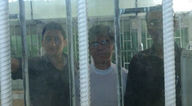
Four Iranian Christians jailed for attending a house church have lost their judicial appeals.
Mojtaba Seyyed Alaedin Hossein, Mohammad-Reza Partoei, Vahid Hakkani and Homayoun Shokouhi were each sentenced in June to three years and eight months in prison.
Shokouhi’s wife Fariba and son Nima both received suspended sentences of two years’ imprisonment at the appeals-court hearing, which took place on Oct. 12 in Shira
Mojtaba Seyyed Alaedin Hossein, Mohammad-Reza Partoei, Vahid Hakkani and Homayoun Shokouhi were each sentenced in June to three years and eight months in prison.
Shokouhi’s wife Fariba and son Nima both received suspended sentences of two years’ imprisonment at the appeals-court hearing, which took place on Oct. 12 in Shira
The six Christians were arrested in February 2012 during a raid on a house church. They were charged with spreading Christianity, disrupting national security, propaganda against the regime and contact with foreign agencies.
This is the latest in a long line of prosecutions of Christians in Iran, with the most common charges being actions against public security and propaganda against the regime.
At a recent meeting of the United Nations Human Rights Council, Attieh Fard, an Iranian lawyer, urged President Hassan Rouhani to make good on his promises to the United Nations in New York by releasing the 42 Christians known to be in jail and the 45 awaiting trial.
“It is obvious that the Islamic government of Iran has taken actions to prevent access of both Christians and the public to Christian societies, to churches, to Christian literature and religion, despite the Christians’ constitutional, national and international rights,” Fard told the United Nations Human Rights Council. “Now Iran has said it is committed to its international obligations, it should in fact start to take measures to protect these constitutional rights.”
At least 300 Christians have been arrested in the past three years in Iran. Many of these Christians were arrested while taking part in house churches—small meetings of Christians who gather to worship and pray together.
Article 26 of the Iranian Constitution gives the right to religious minorities, including Christians, to form societies and to meet together.
The government’s recent release of two Christian women received widespread media attention, but these latest convictions suggest it isn’t the beginning of a trend, despite the announcement that 80 more prisoners of conscience would be released.
Last week, Iranian media reported that another 1,241 prisoners could be released, but thus far Iran has released only a few, most of whom had completed or nearly completed their prison terms, noted Tiffany Barrans, international legal director at the American Center for Law and Justice.
This is the latest in a long line of prosecutions of Christians in Iran, with the most common charges being actions against public security and propaganda against the regime.
At a recent meeting of the United Nations Human Rights Council, Attieh Fard, an Iranian lawyer, urged President Hassan Rouhani to make good on his promises to the United Nations in New York by releasing the 42 Christians known to be in jail and the 45 awaiting trial.
“It is obvious that the Islamic government of Iran has taken actions to prevent access of both Christians and the public to Christian societies, to churches, to Christian literature and religion, despite the Christians’ constitutional, national and international rights,” Fard told the United Nations Human Rights Council. “Now Iran has said it is committed to its international obligations, it should in fact start to take measures to protect these constitutional rights.”
At least 300 Christians have been arrested in the past three years in Iran. Many of these Christians were arrested while taking part in house churches—small meetings of Christians who gather to worship and pray together.
Article 26 of the Iranian Constitution gives the right to religious minorities, including Christians, to form societies and to meet together.
The government’s recent release of two Christian women received widespread media attention, but these latest convictions suggest it isn’t the beginning of a trend, despite the announcement that 80 more prisoners of conscience would be released.
Last week, Iranian media reported that another 1,241 prisoners could be released, but thus far Iran has released only a few, most of whom had completed or nearly completed their prison terms, noted Tiffany Barrans, international legal director at the American Center for Law and Justice.


 RSS Feed
RSS Feed